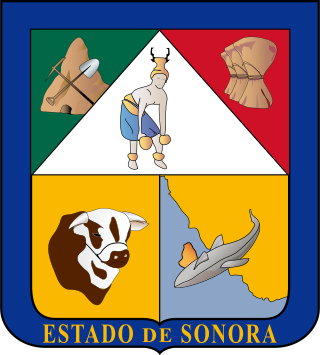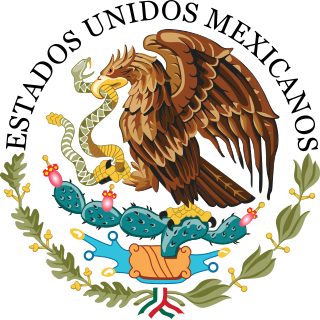Related Research Articles

A constituent assembly is a body assembled for the purpose of drafting or revising a constitution. Members of a constituent assembly may be elected by popular vote, drawn by sortition, appointed, or some combination of these methods. Assemblies are typically considered distinct from a regular legislature, although members of the legislature may compose a significant number or all of its members. As the fundamental document constituting a state, a constitution cannot normally be modified or amended by the state's normal legislative procedures in some jurisdictions; instead a constitutional convention or a constituent assembly, the rules for which are normally laid down in the constitution, must be set up. A constituent assembly is usually set up for its specific purpose, which it carries out in a relatively short time, after which the assembly is dissolved. A constituent assembly is a form of representative democracy.

The Congress of the Union, formally known as the General Congress of the United Mexican States, is the legislature of the federal government of Mexico. It consists of two chambers: the Senate of the Republic and the Chamber of Deputies. Its 628 members meet in Mexico City.

The Chamber of Deputies is the lower house of the Congress of the Union, the bicameral parliament of Mexico. The other chamber is the Senate. The structure and responsibilities of both chambers of Congress are defined in Articles 50 to 70 of the constitution.

The Senate of the Republic, constitutionally Chamber of Senators of the Honorable Congress of the Union, is the upper house of Mexico's bicameral Congress. It currently consists of 128 members, who serve six-year terms.

John B. Weller was the fifth governor of California from January 8, 1858, to January 9, 1860, who earlier had served as a congressman from Ohio and a U.S. senator from California, and minister to Mexico.

Elections in Mexico are held every 6 years to elect a president and every 3 years to elect a legislature. These elections determine who, on the national level, takes the position of the head of state – the president – as well as the legislature.

The Honorable Congress of the State of Nuevo León is the unicameral legislature of the government of the Mexican state of Nuevo León. Each three-year legislative term consists of 42 deputies, with 26 elected through relative majority and 16 through proportional representation.

Marcela Guerra Castillo is a Mexican politician from Nuevo León. She was a local deputy in the Congress of Nuevo León and twice federal deputy of the Congress of Mexico. From 2012 to 2018, she was a senator representing the state of Nuevo León in the LXII and LXIII Legislatures.

The 1912–13 United States Senate elections were held on various dates in various states. They were the last U.S. Senate elections before the ratification of the Seventeenth Amendment in 1913, establishing direct elections for all Senate seats. Senators had been primarily chosen by state legislatures. Senators were elected over a wide range of time throughout 1912 and 1913, and a seat may have been filled months late or remained vacant due to legislative deadlock. Some states elected their senators directly even before passage of Seventeenth Amendment. Oregon pioneered direct election and experimented with different measures over several years until it succeeded in 1907. Soon after, Nebraska followed suit and laid the foundation for other states to adopt measures reflecting the people's will. By 1912, as many as 29 states elected senators either as nominees of their party's primary or in conjunction with a general election.

The Honorable Congress of the State of Sonora is the legislative branch of the government of the Mexican state of Sonora. The Congress is the governmental deliberative body of Sonora, which is equal to, and independent of, the executive.

The Congress of the State of Yucatán, or simply the Congress of Yucatán, is the legislative branch of the government of the State of Yucatán. The Congress is the governmental deliberative body of Yucatán, which is equal to, and independent of, the executive and the judiciary. The Congress of Yucatán is an unicameral legislature.

In the United States, a state is a constituent political entity, of which there are 50. Bound together in a political union, each state holds governmental jurisdiction over a separate and defined geographic territory where it shares its sovereignty with the federal government. Due to this shared sovereignty, Americans are citizens both of the federal republic and of the state in which they reside. State citizenship and residency are flexible, and no government approval is required to move between states, except for persons restricted by certain types of court orders.

The Federal Government of Mexico is the national government of the United Mexican States, the central government established by its constitution to share sovereignty over the republic with the governments of the 31 individual Mexican states, and to represent such governments before international bodies such as the United Nations. The Mexican federal government has three branches: executive, legislative, and judicial and functions per the Constitution of the United Mexican States, as enacted in 1917, and as amended. The executive power is exercised by the executive branch, which is headed by the president and her Cabinet, which, together, are independent of the legislature. Legislative power is vested upon the Congress of the Union, a bicameral legislature comprising the Senate and the Chamber of Deputies. Judicial power is exercised by the judiciary, consisting of the Supreme Court of Justice of the Nation, the Council of the Federal Judiciary, and the collegiate, unitary, and district courts.

Michelle Lujan Grisham is an American lawyer and politician serving since 2019 as the 32nd governor of New Mexico. A member of the Democratic Party, Lujan Grisham previously served as the U.S. representative for New Mexico's 1st congressional district from 2013 to 2019.

Enrique Burgos García is a Mexican politician affiliated with the PRI. He served as a Senator for Querétaro in the LXII Legislature of the Mexican Congress from 2012 to 2015. He previously served as Governor of Querétaro between 1991 and 1997, and as a member of the Chamber of Deputies during the LIX Legislature.

Alejandro Tello Cristerna is a Mexican politician affiliated with the PRI. He served as the Governor of Zacatecas from 2016 to 2021, and also represented the state as a senator during the LXII Legislature of the Mexican Congress and first four months of the LXIII Legislature.

Sonia Mendoza Díaz is a Mexican politician affiliated with the Ecologist Green Party of Mexico (PVEM). She currently serves as a federal deputy in the LXV Legislature of the Mexican Congress from the state of San Luis Potosí. She previously was a senator of the LXII and LXIII Legislatures, a federal deputy during the LXI Legislature and a local deputy in the LVIII Legislature of the Congress of San Luis Potosí, all while with the National Action Party.
César Octavio Pedroza Gaitán is a Mexican politician affiliated with the PAN. He was a senator in the LXII and LXIII Legislatures of the Mexican Congress from the state of San Luis Potosí. He also served as a federal deputy during the LXI Legislature and was the mayor of the city of San Luis Potosí from 2004 to 2006.

Jorge Luis Preciado Rodríguez is a Mexican politician who used to be affiliated with PAN until his resignation from the party in 2023 after 27 years affiliated. He served as Senator of the LXII an LXIII Legislatures of the Mexican Congress representing Colima first minority. He also served as proportional representation Deputy during the LIX and LXIV Legislatures, as well as a proportional representation local deputy in the Congress of Colima during the LII and LV Legislatures. He was candidate for the governorship of the state of Colima in 2015, but lost by 511 votes to the PRI candidate Ignacio Peralta. He was the PAN candidate who came closest to achieving the state governorship.
References
- ↑ "Perfil del legislador" (in Spanish). Legislative Information System. Retrieved 11 November 2013.